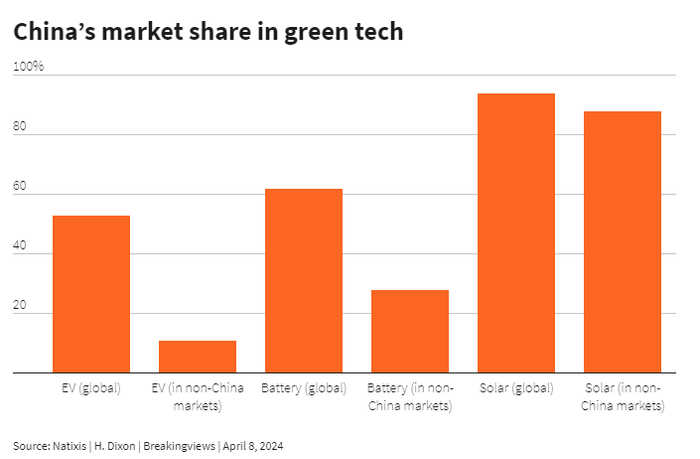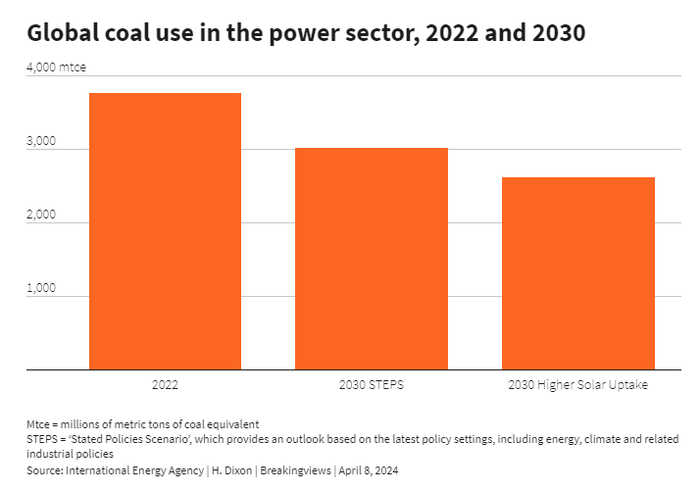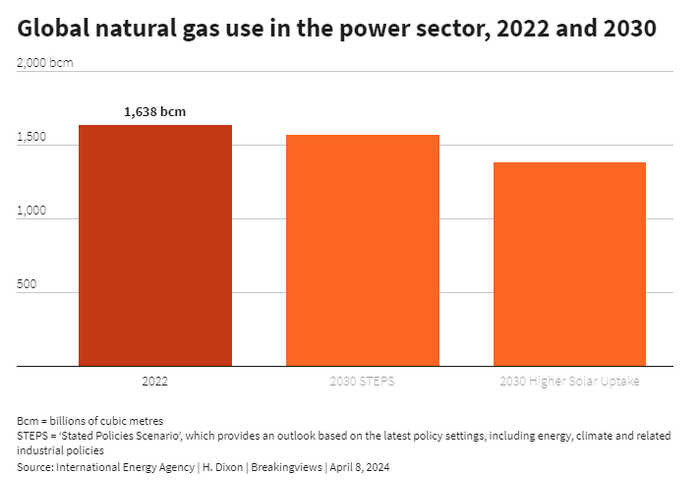Published 18:33 IST, April 8th 2024
Next Chinese trade war could benefit the planet
The whole world would impose a high price on carbon emissions, incentivising producers and consumers to shift to green technologies.
- Republic Business
- 5 min read

Good green glut. A trade war between China and the West over green goods is certainly not the best way to combat climate change. It will lead to inefficient production, wasted money, slower economic growth and geopolitical tension. But it may, nevertheless, still slow down global warming.
As Beijing floods the world with cheap green goods, the rich democracies and some emerging markets will put up trade barriers. That will delay their energy transition as they’ll pay more for clean technology than they otherwise would. But the glut of electric vehicles (EVs), solar panels, batteries and the like will speed it up elsewhere. After all, this kit will have to end up somewhere.
In theory, there is a much better way to stop the planet frying. The whole world would impose a high price on carbon emissions, incentivising producers and consumers to shift to green technologies. There would then be no need for expensive and wasteful subsidies to drive the process.
China and the West would trust each other rather than engage in a power struggle. Neither would then worry that one might gain a technological advantage that it could use against the other – and production of green goods could gravitate to those places with a comparative advantage making them.
Western politicians wouldn’t protect jobs in green industries either. So there would be no need for tariffs on Chinese imports.
Coming clash
Dream on. Carbon pricing either doesn’t exist or is far too low in most of the world. China and the West are in a quasi-Cold War. Meanwhile, almost every country with industrial aspirations wants a slice of fast-growing green industries.
The People’s Republic already dominates what it calls the “three new” industries – solar, EVs and batteries. This is partly because it subsidised them, partly because it is good at manufacturing and partly because it built up economies of scale to serve its own vast market.

Chinese investment in clean technology rose a further 40% to $890 billion last year, according to an analysis for Carbon Brief. Not surprisingly, the price of solar panels dropped 42% last year, while that of batteries halved.
President Xi Jinping has made these industries a strategic priority, partly to provide jobs as China goes through a painful property crisis. Companies are piling in because these are some of the few sectors where they can make positive returns, although those are now falling, says Alicia Garcia Herrero, chief economist for Asia Pacific at Natixis.
The People’s Republic has been exporting its excess capacity in solar panels for a while, and had 88% of the non-China market last year, according to Natixis. The same process is now starting with China-made batteries, which had 28% of the non-China market last year, and EVs, which had 11%.
Other countries, which previously lost their steel, aluminium and solar industries to China, are reacting faster this time, says Wendy Cutler, a former acting deputy U.S. Trade Representative now at the Asia Society Policy Institute. The EU has opened up an anti-dumping investigation against EVs imported from the People’s Republic, which could lead to the imposition of countervailing tariffs. South Korea and Japan, other big auto manufacturers, are worried – as are a few rapidly industrialising emerging economies such as India, Brazil and Turkey.
The biggest flashpoint will be between the United States and China. The green subsidies Washington is paying domestic producers as part of its Inflation Reduction Act and its existing 27.5% tariffs on Chinese auto imports may not be enough to stop an influx of cars from the People’s Republic, says Cutler. Beijing, for its part, last month complained to the World Trade Organization about Washington’s subsidies.
Janet Yellen, the U.S. Treasury Secretary, sounded the alarm over Chinese excess capacity when she arrived in Guangzhou last Friday. But Beijing is not going to stop building up these sectors, says Hung Tran of the Atlantic Council. The West will then retaliate.
Beijing may respond with tit-for-tat sanctions. If Donald Trump is by then U.S. president, the trade war could get ugly as he says he may impose 60%-plus tariffs on Chinese imports.
Green linings
The impact on the planet is another matter. True, the transition in countries that stop cheap Chinese imports will probably take longer. After all, their consumers won’t be so keen to buy EVs and their utilities won’t roll out solar power so rapidly if they have to pay more than they otherwise would.
But there may be mitigating factors. For a start, Chinese green tech companies are investing in foreign markets to circumvent potential tariffs, says Ilaria Mazzocco of the Center for Strategic and International Studies. The U.S. may be largely off limits but Europe, Southeast Asia and Latin America will still get lots of Chinese factories and goods.
What’s more, the United States may be able to energise its “friendshoring” initiative, which envisages developing supply chains in allied countries while avoiding dependency on China. Because its allies should be playing to their comparative advantages, this could keep costs down – even if not to Chinese levels.
Meanwhile, a glut of Chinese EVs, solar panels and batteries should spur the transition to a low-carbon economy in the rest of the world.

Look at renewable energy. The world will have the capacity to produce 1,262 gigawatts of solar power in 2030 but will only install 498 GW, according to the International Energy Agency’s base scenario. If, instead, the world installed 800 GW, the extra zero-carbon electricity supplied would see China’s coal-fired generation fall 20% below the base case in 2030. Generation by all fossil fuels in Latin America, Africa, Southeast Asia and the Middle East would be a quarter lower.

Given that the People’s Republic is by far the world’s largest carbon polluter and emissions in the Global South are growing rapidly, fast-tracking their transitions would be good for the planet. While a trade war would bring a lot of problems, it is a better scenario for climate change than one where China wasn’t cranking out green technology and the West moved ahead at a leisurely pace.
Updated 18:33 IST, April 8th 2024